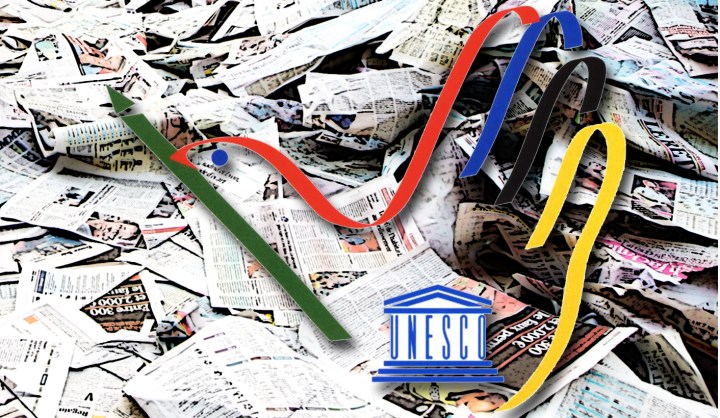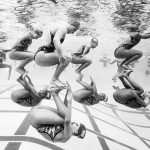Maverick Life, South Africa
Op-Ed: World Press Freedom Day 2015, SA edition

In South Africa, press freedom, our freedom of expression rights, and communications rights, are suffering from a disease. There are a number of obvious symptoms of this illness. We need to take a look at these to determine what they are a symptom of, what is causing them, perform a diagnosis, and then work out the cure for the disease. But, part of the ‘cure’ means changing our understanding of the term ‘press freedom’, writes JULIE REID.
If we are going to talk about ‘symptoms’, what has been happening to show us that media freedom, and freedom of expression rights, are not what they currently should be in South Africa? The truth is, a lot. Last year, for World Press Freedom Day in 2014, I wrote a column describing the various developments on this front from 2010 to 2014 indicating a slow but significant decline in South Africa’s freedom of expression status, across all sectors of society and not only for the press. I’m not going to repeat any of that here. I’m just going to talk about what has happened within the last year.
First, if we are talking about press or media freedom in particular, then yes, it’s a little sickly. Symptoms over the past year include the State of the Nation signal jamming debacle, and the selective camera shots of the floor of the National Assembly chamber during the subsequent dramatics, meaning that the pictures broadcast to the public could not include shots of the Economic Freedom Fighters (EFF) members of parliament being forcibly removed from the house. A related court case, brought about by joint applicants of media houses, the Right2Know Campaign and the Open Democracy Advice Centre, challenges a clause in Parliament’s broadcasting policy that allows for the broadcast feed to be cut if there is disorder during a National Assembly sitting, saying that this clause is in contravention of the Constitution.
Another symptom: Former Sowetan journalist Cecil Motsepe’s conviction of criminal defamation was overturned on appeal in a move which initially appeared to be a victory for freedom of speech. Not so. The judge ruled that although Motsepe’s conviction should be overturned since the state failed to prove he acted with the intention to defame, the judgment also found criminal defamation is in fact consistent with South Africa’s Constitution. Good news for Motsepe, but bad news for journalism, because for the first time it opens a very legal large door to criminalising speech. It’s worth noting that the Declaration of Table Mountain of 2007 called for African governments to abolish insult and criminal defamation laws that frequently lead to the arrest and imprisonment of journalists across the continent and a campaign to this end has been spearheaded by the Special Rapporteur on Freedom of Expression and Access to Information to the African Commission on Human and People’s Rights (ACHPR) in recent years. So, while a South African court has moved to criminalise libel, there is a continent-wide initiative calling for the decriminalisation of defamation in African countries – meaning that while one hopes Africa is moving forward on this issue, South Africa takes a step backwards.
More symptoms of the sickly state of press freedom include the increase in instances of direct attacks on journalists, including police harassment of reporters across the country who have been subject to wrongful/illegal arrest, forced to delete photographs or barred from entering particular spaces. Ricky Dire (Daily Sun) was violently assaulted by the police in Rustenburg after taking pictures of them allegedly accepting a bribe. Freelancer Sandiso Phaliso was wrongfully detained by the police while covering a story for the Daily Sun on a vigilante attack in Phillipi. Nikolaus Bauer (eNCA) had pictures deleted from his camera by an African National Congress (ANC) bodyguard, and Mpho Raborife (formerly Sapa) was forced by police to delete her photographs which she took during the xenophobic violence against foreign nationals in Soweto in January 2015. Media24 journalist Jan Gerber was assaulted by security services and forced to delete his pictures just outside Parliament. On 24 February, journalists were barred from entering the gallery at the Gauteng Provincial Legislature. On the same day journalists were escorted out of Chris Hani Baragwanath Academic Hospital by security after CEO Sandile Mfenyana refused to allow media to accompany the Public Service Commission (PSC) on its inspection of the hospital. In November, News24’s Le Roux Schoeman was detained by Eskom security services at the Majuba power station after one of the coal silos collapsed. We all remember that in January 2014, freelance photojournalist Michael Tshele was shot, murdered by a police officer in Mothutlung. He was the first journalist killed by the state since 1994. It is significant that more than a year after his death, his killer still enjoys impunity. And, in February 2015, the State Security Agency (SSA) confirmed handing Mpumalanga premier David Mabuza intelligence reports on the lives and movements of journalists in the province. So, we live in a country where killing journalists is okay, and spying on them is also quite alright.
Apart from direct attacks on individual journalists, the past year has also seen renewed movements to infringe on the freedom of expression rights of the media as a sector. In July 2014, SABC acting chief operating officer Hlaudi Motsoeneng called for the registration of journalists – this type of regulation is internationally understood by a wide array of multilateral institutions, civil society groups, media activists, media professionals and anyone with a minor semblance of an understanding of the fundamentals of democracy, to be a bad thing for free speech. Yet, after displaying such an unfathomable dearth of understanding of freedom of expression rights, Motsoeneng was rewarded by being permanently appointed as COO of the largest media outlet in the country, and this in spite of the Public Protector’s damning report finding him guilty of maladministration and abuses of power.
The Film and Publications Board’s (FPB) Draft Online Regulations, if officially realised, would amount to pre-publication censorship for anyone wanting to digitally publish any content of any kind via a digital platform, including on websites, blogs or social media platforms like Twitter or Facebook. While these regulations serve as an impediment to free speech for more than just the media sector, and indeed for any user connected to the Internet, they would have a hugely negative effect on the capacity of the digital news media to publish content in a timely manner, if at all. The regulations stipulate that before content is posted online it should first be subject to a bureaucratic classifications procedure. As swathes of content is uploaded every day, the policy itself is obviously un-workable, impossible to practically administer and it is quite likely that the majority of users will simply ignore the classifications procedure prior to publication, as well as ignore the requirement of paying a publications fee to the FPB, in the same way that they ignore e-tolls. The FPB does all of this under the moralistic guise of protecting children from harmful content online, but fails to see that its regulations are so unworkable that they will do nothing of the sort. But if realised, these new regulations would serve to criminalise anyone for posting anything online, including the digital news media. It is all too obvious how this could be used as a post-publication political tool to silence dissenting voices in the digital space.
Last week President Jacob Zuma used the xenophobic violence wracking the country as a thinly-veiled excuse to take another stab at the press, saying the Sunday Times’ publication of the pictures of Emmanuel Sithole’s murder was ‘making us look bad’. (Dear Mr President: it is the most basic responsibility of the press to tell and show us what is happening within our own country. In this case, it is not the press that is making us look bad. It is xenophobic violence that is making us look bad. Full stop.)
During the past year we witnessed the splitting of the department of communications into two new separate ministries and departments, one of which, also confusingly called the department of communications, was described in a manner more akin to a ministry of propaganda by the president at its inception. Minister Faith Muthambi seems to have read this memo. Last week she assisted Motsoeneng in painting a rosy picture of the SABC’s finances, saying that “The SABC is on a sound financial footing”. This despite the SABC’s projected loss of R501-million for the financial year just ended in March, and the R1.1-billion that the SABC has lost in value after a year with Motsoeneng at the helm. No one has dared to say it yet, but if these Sunday Times reports are true, it means that a minister lied to Parliament. But hey, that’s spin-doctoring for you.
Muthambi danced the propaganda tune further by telling MPs that parliament should initiate action on a regulatory system for the print sector so that a meaningful transformation agenda can be met – a process which she intends to be a part of. In a split second Muthambi resuscitated the ANC’s calls from 2007 and 2010 for the dreaded Media Appeals Tribunal (MAT). One can only assume she is ignorant of the various changes that have been implemented to the Press Council of South Africa since then. We must assume that our minister of communications has not heard of the work of the Press Freedom Commission, nor read its final report. The minister is clearly oblivious to how members of her own party frequently make use of the Press Ombudsman system, and how often newspapers are sanctioned in their favour. One hopes that she is aware that the ANC delegation at the Press Freedom Commission’s public hearings called for an independent, as opposed to a statutory, system to regulate the content of the press – which coincidentally, is what we now have. But most worrying is that the minister seems to believe the regulation of the content of the press, and the transformation of the print media sector, are the same thing. They are not. One cannot, for example, alter ownership structures, ensure a greater level of media diversity, or dismantle media monopolies by setting up a regulatory complaints mechanism for post-publication content.
It is not that the print sector does not require ‘transformation’ of a sort. It does. But it is a pity the minister sustains the justification of the MAT with the transformation agenda because it is a weak argument. If we really want to start talking about the transformation of the print sector, we need to start questioning the various economic, geographic and social barriers which prevent the majority from having widespread access to a variety of printed news, such as the cost of printed newspapers, their distribution to mainly urban centres, and the predominance of the English language. In short, a Media Appeals Tribunal will not solve any of this, nor can it do anything to address the highly monopolised nature of the South African media market. There are a lot of problems with the print media sector, but the administration of complaints against alleged bad quality journalism is not one of them. (Come on, Minister Muthambi, do your reading and get up to speed on this. It’s your job.)
If all of the above are symptoms of the disease that besets our media freedom, then what is the cause of these symptoms? There are no prizes here for the answer: a general intolerance by the powerful to criticism and dissent. A growing culture of state secrecy and unaccountability, motivated by the desire to conceal corruption, self-enrichment, maladministration, the like. And if not that extreme, then simply an arrogant irritation at the thought of investigative probing by the press into what the public rightfully ought to know. None of this happens exclusively within the vacuum of the media sphere. This root cause of the disease is significantly also revealed in the broader context of societal symptoms such as the militarisation of the police and a collective psychology of authoritarianism in the SAPS, and the securitisation of the state by the security and intelligence services. And, have we spared a thought for the continual assassination and harassment of whistle-blowers?
So, what is the cure for this disease? The cure comes in many parts. One of those parts is the preservation of the investigative function of a critical news media. But the media has been frustratingly complacent in defending its own freedom of expression rights. Yet much of the responsibility for the preservation of the freedom of the press in South Africa lies with the media sector itself.
First, we need to stop thinking about the term ‘media freedom’ as applying to the media alone. It doesn’t. There are two sides to this coin. Media freedom in a more holistic sense involves the notion of allowing journalists and editors to do their work freely and independently, yes, but it also involves the freedom of the ordinary person to access that work. If we apply the idea of media freedom to media producers only, with no regard to the audience, then we are only considering half of the picture and ignoring what is the more important half. The entirety of the media chain does not only involve media producers, but includes the audience, so our notion of media freedom needs to be applied to the whole chain, not only part of it.
In South Africa the cost of accessing media content is prohibitive to most, the media are not distributed equitably and are published or broadcast in too few languages. In this country your access to the media is entirely determined by how much money you have, where you live and which languages you speak. This means that most South Africans are limited in their media choices, and their news media consumption is dominated by the state’s own pseudo-propaganda machine, the SABC. The media outlets that break crucial exposes, the publications of the best centres of investigate journalism, and the work of our core handful of really excellent and brave journalists, rarely reaches the majority. So, ‘media freedom’ is not just about what we are allowed to say via the media. ‘Media freedom’ also involves whether or not we are free to access the quality media at all. Media freedom needs to be understood both in terms of what we are allowed to say, and what we are able to access. Because what is the use of a media that is allowed to speak freely, if the majority do not have any access to it? We cannot call that media freedom.
Another part of the cure for the sickly state of freedom of expression via the media, starts in the newsroom. Yes, I am saying that the media itself can do more to defend its own freedom of expression rights (as opposed to complacently relying on its representative bodies such as Sanef, or movements like the Right2Know campaign). Apart from becoming more accessible to more people, the media, and particularly the press, must work to become precious to those people. If more people really value the investigative press, more people are likely to defend its freedoms when needs be.
How can the press become more precious to more people? Easy. Tell their stories. Properly. Stories from the ground are just as important, if not more so, as stories from ‘the top’. It’s on the ground that the real failings of the governmental officials and the political elite, with whom the media are so enamoured, are most acutely revealed anyway. It should not be too difficult for journalists to stop stereotyping people like protestors, and instead of representing them bluntly as violent hooligans, engage in some ethnographic journalism to discover the real causes of their discontent as well as the factual historical context of their current struggles.
Journalists and editors also need to stop arrogantly believing that it is up to someone else to defend their freedom of expression rights, and that we will automatically all spring to their rescue whenever censorship threatens. Every section of civil society currently has its own battles to fight. Defending media freedom, if it happens, will happen as an aside or temporary endeavour for most. Journalists must be activists for their own rights if they wish to retain them. In almost every media freedom related action or initiative that I have been involved with over the past five years the absence and lack of interest of journalists has been telling. Here many journalists will invoke the now outdated argument that since their profession requires objectivity, it would be inappropriate for them to act as activists. That is hogwash, a cop-out and an abdication of responsibility. It is an argument that has been dispelled again and again, and I’ll put my money-where-my-mouth-is by saying that I similarly do not feel it is an appropriate argument for the academic profession, where it is also often touted, as many of my own colleagues will tell you.
The symptoms are all there. It would be naïve to deny that the centres of political power are seriously irked at the press and some among them intend on doing something about it. If the investigative media does not want to be ‘fixed’ via authoritarian measures enacted by a paranoid state, then the best thing it can do to prevent that from happening is to fix itself. DM

















 Become an Insider
Become an Insider